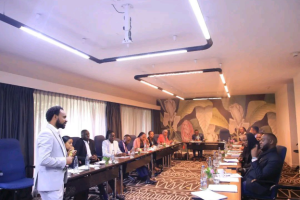
In light of this title, one might ask why it should be necessary to focus on “security,” rather than, say, “democracy,” “synergy,” or, indeed, “prosperity.”
Doubtless, there will be those who argue that it is more important to rid the country of the last vestiges of ‘the old dictatorial regime’ than to stubbornly focus on the need for ‘security’. In fact, some might postulate that this “security, peace and stability above all else” attitude is exactly the ‘old, pre-reform-regime, dictatorial attitude’ that is now redundant or out-dated. Others will be quick to point out that people enjoy ‘liberty and freedom’ like never before, and this is certainly more important than ‘security’, if the price for this ‘security’ is to stifle freedom of expression.
Just as one would expect, Western observers, so-called “Ethiopia experts,” and journalists, have been persistent in their claim that the pre-reform regime had ‘kept a tight lid on ethnic tensions’ – implicitly or explicitly stating it was ‘a dictatorship, – but, now, with the new freedom, these ‘old ethnic tensions’ were ‘bubbling to the surface’.
Western journalists have been quick to identify this as ‘the greatest threat for Ethiopia’, ‘Prime Minister Abiy Ahmed’s biggest challenge’, or other such unenviable distinctions.
So, is there something to these criticisms? Must ‘freedom’ or ‘democracy’ really be given a greater value – or take precedence over – ‘security’? Is it, perhaps, actually true that being too concerned about ‘security’ is a sign of a dictatorial mindset that has had its day – in Ethiopia, and in the world?
Let us take a moment to analyze. The election campaign, now in full swing, potentially has security implications. So this seems a good time to reflect.
Western observers, and critical Ethiopians at home and abroad, tend to take for granted that freedom of expression must be given the highest priority, that it is a sign of a matured democracy, and, ultimately, beneficial for society.
It is often implied that, while security is important, it is not worth the loss of ‘freedom’.
This may sound ‘intellectual’, and many – critical Ethiopians in the diaspora, and academics returned from abroad included – perceive groups and individuals arguing thus as ‘mature’, ‘sophisticated’, and generally worth emulating.
On closer examination, however, it becomes obvious that such high-minded musings are of a purely theoretical nature, doubtless influenced by Western mainstream thinking, and intellectuals and philosophers who are ignorant of the every-day situations people face worldwide, and of the simple fact that it is impossible to lead a fulfilling life if the basic need of security is not met.
The current sociopolitical state of Ethiopia illustrates the point.
At first, Western observers and critics, at home and abroad, sang the praises of the reforms, and hailed the ‘new freedom’ in Ethiopia. Finally, Westerners, including investors, implied, Ethiopia was emerging from the “shadows of dictatorship. The ‘brutal military’ was deprived of its power, and its ‘dictatorial leaders’ brought to justice, Western journalists stated eloquently.
And, yet, the reality was different.
Many of the Western news organizations are now reporting that the instability has been, at least in part, caused by ‘activists’ or ‘opposition politicians’. In light of the violence, the lives lost, the property destroyed, they concede that, in practice, security does need to be given due consideration.
Similarly, at this point in time, it has become hard to find Ethiopians who do not believe that security is, if not more important than ‘freedom’, at least equally important, and must take precedence over the right of individuals to spread messages of hatred and false information.
Having thus considered, the logical conclusion must be: If, in practice and in the interest of society, security takes precedence over freedom’, then those who provide it should be duly recognized. For while it is true that each and every member of society has a responsibility when it comes to stability and societal cohesion, it would not be logical to disregard the contribution of the security forces.
This means that, part of the responsibility of civilians is to ensure that the relationship of the general public with the security forces is characterized by mutual trust and a positive perception.
The men and women in uniform deserve our support, certainly from a pragmatic and patriotic point of view.
Alas, that is not what they have been getting – not nearly enough!
Members of the armed forces have often been seen as ‘political facilitators’ of the ‘old regime’. Too many Ethiopians consider soldiers to be either not intelligent enough for any other profession, the henchmen of the ‘old dictatorship’, or brutal killers.
But, once again, the reality is different.
The members of the Ethiopian National Defense Force (ENDF) are generally motivated by a deep sense of patriotism. They see it as their duty to protect and defend the whole society. They take great pride in ensuring peace, stability, and security.
Day and night, they protect us, guaranteeing and maintaining the security we so much need.
Let us, therefore, in this historic time of change, pledge our loyalty and support to our security providers. Let us trust and respect them – if only in the interest of peace and stability.
They certainly deserve it!
The Ethiopian Herald Friday 3 January 2020
BY KALYPSO SCHULMEISTER




